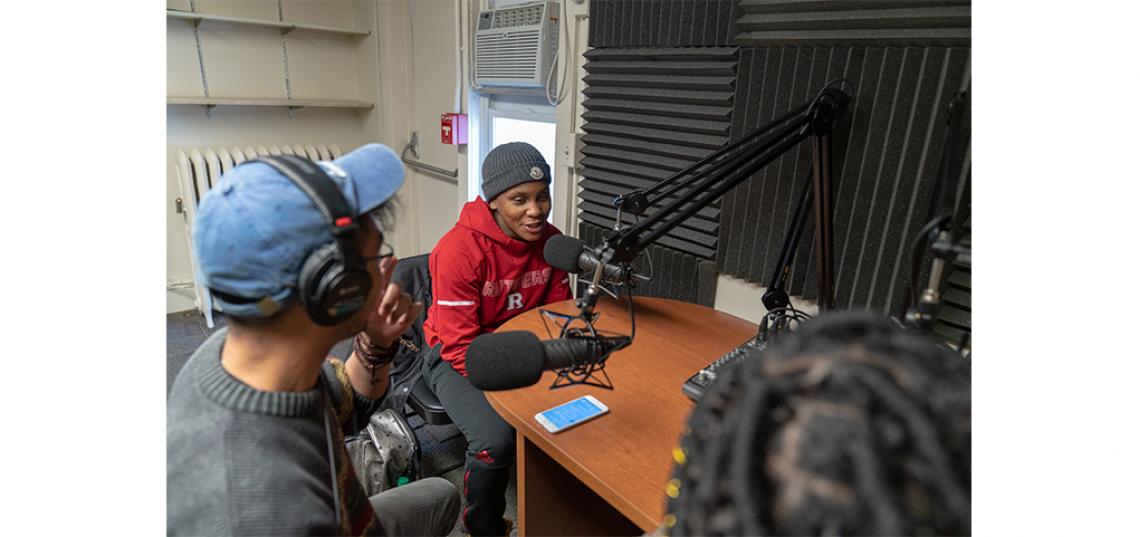
While working as Co-Executive Producer and Co-Host of Gimlet Media’s podcast, Uncivil, SC&I’s Assistant Professor of Journalism and Media Studies Chenjerai Kumanyika also brings his vast expertise and experience to SC&I students by teaching an undergraduate course on podcasting titled “Topics in Creative Media Practice II” (Course Code: 04:567:477).
Kumanyika, who delivered the acceptance speech when Uncivil won a Peabody Award in 2017 for an episode titled “The Raid,” said, “I try to craft a curriculum that on one hand enables me to teach my students the best of what I know, and how I’ve been successful, while also enabling students to make exciting projects that will be useful for their careers. My colleague Neal Bennett also teaches in our department, and we complement each other when it comes to teaching different kinds of podcasts. Neal built the studio and brings a really rare wealth of industry experience. I wish I could take his class!”
Digital Media Producer and SC&I Teaching Instructor Neal Bennett, when asked what inspired him to set up the first podcasting studio at SC&I, said, “Actually, I wasn’t initially the first person to think of adding the podcasting studio. Steve Miller, department chair Susan Keith and Steve Garwood (who is no longer at SC&I), were all thinking about developing some space for students to record before I even started working at SC&I. Once I started working at SC&I and teaching the Digital Media Production course, I took over the budgeting, purchasing, and installation of the studio.
“The difference this makes is students now have somewhat of a quiet space to record using multiple microphones. Students can also have guests Skype or call in and record those conversations as part of the podcast. It’s a nice space for students to meet, record and edit their shows. We’re hoping to install swipe access soon so students can access the studios without needing a professor to unlock the door. I am hoping this upgrade will encourage more students to take advantage of producing their own podcasts.”
Kumanyika explained that his class appeals to any student who wants to be part of the growing podcast industry, explaining that the course fits well into SC&I’s curriculum because “There’s a way to think of podcasting solely as sound and technology, but I think it also connects to other parts of our journalistic and reporting curriculum, where it’s really about writing, about research, understanding how to structure a story, so that people can understand it...This class strengthens those skills.”
Bennett said his Digital Media Production class, which complements Kumanyika’s course, “Introduces various multimedia systems and formats to students. The introduction and study of these systems help them develop technical skills used to produce and edit original content. In this class they explore the foundations of development, content creation and distribution across multiple platforms. Students produce websites, podcasts and video segments throughout the semester. They learn how to utilize digital media production hardware, software and apps to create original content for multimedia storytelling.
“I think this course is important, especially in today’s digital environment. In today’s job market, students need to understand various digital media production workflows from concept to distribution. They need to identify multiple media formats and choose the appropriate settings to produce quality programming. I also think this course is a great foundational course complimenting other courses students may have already had or will have during their time at Rutgers.”
Listening to the radio, Kumanyika explained, first sparked his interest in podcasting, and he appreciates that podcasts are a form of narrative journalism. Podcasts, he said, “Teach you a lot about whatever the subject matter is, often with layers of individual experience, while also being immersive and transportive.”
His work first became known to the world of public radio from essays he wrote for NPR Code Switch, Kumanyika said, which were often personal stories weaved in with political analysis. Later, he said, Jack Hitt (his co-host of Uncivil) and others at Gimlet Media reached out to him in order to collaborate, and they started the production of Uncivil. They are currently making decisions about the future of the podcast.
Kumanyika emphasizes the importance of radio and podcasting in today’s world, and said “Longform audio is really effective in a time when there’s one part of media that’s trying to get us to think everything is a 30 second Instagram video...The explosion of podcasts shows that people really don’t mind content that makes them think deeply, it just has to be rendered in an entertaining way.”
Students in his class are assigned two major projects, Kumanyika said. “One project uses a more rich, audio documentary style, and the other one offers more leeway and can be about something funny, about sports or whatever they’re interested in.”
He also particularly enjoys teaching this class, he said, because “There are so many podcasts, I am able to talk with the students about what they’re interested in…and learn from them too.”
One of Kumanyika’s goals for the class, he explained, is to be sure students are able to take away the knowledge that they can use podcasting to create work based on their personal interests. He is most interested, he said, in teaching his students the skills and process of making podcasts, so they will be able to keep making them long after the class has ended, and hopefully for the rest of their lives.
To learn more about the Journalism and Media Studies Department at the Rutgers School of Communication and Information (SC&I), click here.
For more information about majoring in Journalism and Media Studies at SC&I, click here.
